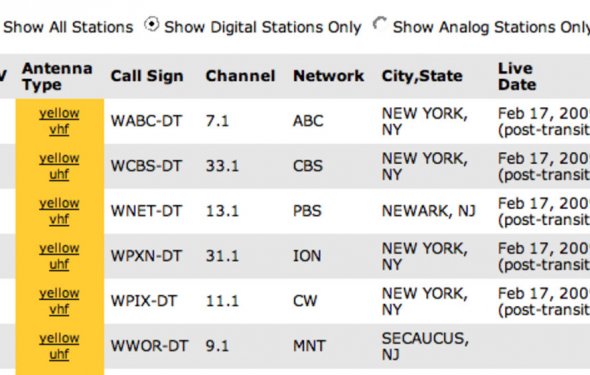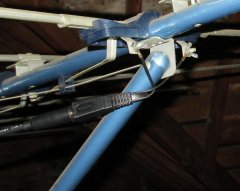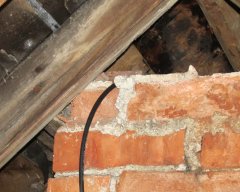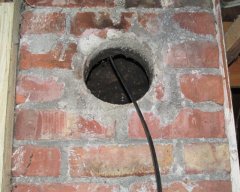Analog antenna to digital TV

 Cutting the cable (or ditching the meal) is a great way to cut costs. Lots of great content is accessible via the Internet, from sources like YouTube, Netflix, iTunes, among others. But there could be times when you’ll miss your neighborhood stations, whether for disaster news and notifications or simply just neighborhood programming. If you're in a rural location (or a crowded metropolitan area) where rabbit-ears just don’t cut it, home might curently have a medium or large TV antenna installed inside loft or on the roof. But will your old antenna assist modern, digital TV?
Cutting the cable (or ditching the meal) is a great way to cut costs. Lots of great content is accessible via the Internet, from sources like YouTube, Netflix, iTunes, among others. But there could be times when you’ll miss your neighborhood stations, whether for disaster news and notifications or simply just neighborhood programming. If you're in a rural location (or a crowded metropolitan area) where rabbit-ears just don’t cut it, home might curently have a medium or large TV antenna installed inside loft or on the roof. But will your old antenna assist modern, digital TV?
A Keyword About Antennas
You might’ve been aware of “HDTV” or “digital” television antennas. In fact, though antennas could be designed for better reception (making few or no electronic artifacts), there’s truly no these types of thing as an electronic digital television antenna. TV antennas don’t differentiate between analog and electronic signals – they’re simply choices of metal rods that pick-up UHF and VHF transmissions at particular frequencies. The antenna does not care what it’s picking right up; it simply passes signals along towards tuner (be it a tuner field or a tuner as part of your television), which decodes all of them into a format that may be presented in your TV.
While more recent antennas might-be better-designed, older antennas may work equally well, provided they’re adequate and (if they’re directional) positioned properly. Inside our instance, the antenna ended up being a large, 1970s multi-directional behemoth that has been dangling within attic, unused for a long time. But my dad remembered it working quite well for analog TV, before cable was obtainable in our location, so we decided it absolutely was well worth the danger to use wiring it back right up.
 just what You’ll require
just what You’ll require
Depending on your house’s framework alongside aspects, you might need some hand resources. However for the antenna wiring itself, you’ll only need a few things:
- A balun (or “impedance matching transformer” as Radio Shack calls it)
- an amount of RG6 coaxial cable (we moved with quad-shielded)
A balun is a tool that converts between an unbalanced sign and a balanced one. For TV wiring, it converts old 300-ohm twin-lead wire to new 75-ohm coaxial cable. For those who have existing twin-lead wiring (in good shape) cost your television, you are able to just make use of a balun in which the twin-lead stops and a quick length of coax to connect it to your TV. Otherwise, coaxial typically stands up better.
There are lots of arguments about twin-lead vs. coaxial – I’ll leave it for you to-do pursuit upon which is better to use in your needs. In my instance, the twin-lead had been cut halfway down the region of the home, plus it had beenn’t also working to the family area (in which our new TV is) anyway, so we went for coax.
The Antenna
 The first rung on the ladder in linking the antenna into TV is very first getting to the antenna. If yours is roof-mounted, you’ll must work out some care. Attic-mounted antennas (like ours) are considerably better to reach, but our attic does not have actually floorboards, therefore walking to the antenna became a delicate maneuver.
The first rung on the ladder in linking the antenna into TV is very first getting to the antenna. If yours is roof-mounted, you’ll must work out some care. Attic-mounted antennas (like ours) are considerably better to reach, but our attic does not have actually floorboards, therefore walking to the antenna became a delicate maneuver.
Our antenna uses two bolts with wing peanuts to carry the double prospects. This is when we attached the balun.
Beneath the correct circumstances, a pre-amplifier (which boosts the signal) could be needed. But as pre-amps may improve sound, it is not advised to utilize one if you do not have to. Within my situation, our antenna was adequate that used to don’t believe we’d require a pre-amp.
Routing
Here’s the difficult part: routing the cable down seriously to it. We won’t go into an excessive amount of detail right here, as every residence varies, but in our case, the cable could only run down the chopped-off chimney remnant inside attic…
…and out through a vent when you look at the chimney down when you look at the cellar. We had to connect a pair of pliers toward cable to load it enough to allow it to be go-down the chimney, since it was cool together with cable held coiling.
From there, we'd to operate it through the ceiling of the basement, around a cool atmosphere return vent, and out into the crawlspace. During the very end associated with crawlspace, we drilled a hole behind the television for cable to operate up through.
Success
We linked others end associated with coaxial cable into TV, scanned for stations, and rather than the usual six we’d had with smaller antennas (three stations with a high transmit energy, plus subchannels), we found 21 stations, including a few HD channels (KCCI supposedly arrived through in 1080p, though our TV is only 720p).
KCCI’s transmitter is located (with various other towers) about an hour or so (50 kilometers) south of in which we stay. We really acquired two areas of Iowa Public tv – KDIN in Des Moines and KTIN in Fort Dodge!
|
Viewtv AT-163 ATSC Digital TV Converter Box Bundle with ViewTV Flat HD Digital Indoor TV Antenna and ViewTV HDMI Cable w/ Recording PVR Function / HDMI Out / Coaxial Out / Composite Out / USB Input CE (Viewtv)
|
|
|
Infitary Digital ATSC HD TV Receiver Converter Tuner Box for Analog TV with Recording PVR Function HDMI YPbPr RCA Coaxial Composite Output / USB Input USA Home Theater (Infitary)
|